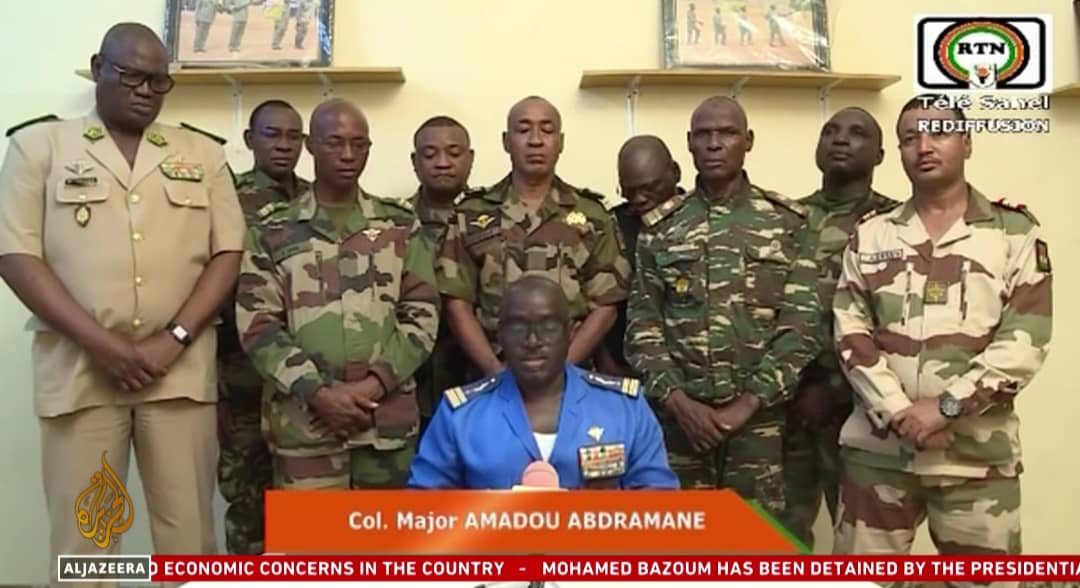Niger Coup: UN suspends humanitarian operations
UN humanitarian operations have been suspended in the Republic of Niger due to a coup in the troubled Sahel country, a spokesman s…

UN humanitarian operations have been suspended in the Republic of Niger due to a coup in the troubled Sahel country, a spokesman said Thursday.
The number of people in need of humanitarian assistance in Niger has risen precipitously from 1.9 million in 2017 to 4.3 million in 2023, according to the UN Office for the Coordination of Humanitarian Affairs (OCHA).
And the number of people suffering from severe food insecurity is expected to reach three million during the lean season (June to August), before the next harvest, it said.
OCHA “is telling us that humanitarian operations are currently on hold, given the situation,” UN spokesman Stephane Dujarric said.
- NIGERIA DAILY: How Doctors’ Stike Is Affecting The Ordinary Nigerians
- Dry spell: NDE trains 50 Borno youths on agric techniques
Niger’s armed forces chief on Thursday declared his support for troops who said they had overthrown the government despite President Mohamed Bazoum’s defiant stand.
The army needed to “preserve the physical integrity” of the president and his family and avoid “a deadly confrontation… that could create a bloodbath and affect the security of the population,” the army chief of staff Abdou Sidikou Issa, said in a statement.
The UN said Bazoum must be released immediately and constitutional order restored after elite troops detained him and declared they had taken power.
Bazoum was confined in Niamey on Wednesday by members of his presidential guard, who hours later announced that “all institutions” in the troubled West African nation would be suspended, the borders closed and a night-time curfew imposed.
“I am shocked and distressed by the attempted military takeover in Niger and condemn it in the strongest terms. All efforts must be undertaken to restore constitutional order and the rule of law,” UN human rights chief, Volker Turk, said in a statement.
“President Mohamed Bazoum must be immediately and unconditionally released, and his security ensured. The arbitrarily detained members of his government and their relatives must also be released forthwith and without preconditions.
“I urge all actors to refrain from violence and respect the rights and fundamental freedoms of all. It is in the interests of all the people of Niger that the important democratic gains made in recent years are safeguarded and preserved.”
The 63-year-old is one of a dwindling group of elected presidents and pro-Western leaders in the Sahel, where since 2020 a rampaging jihadist insurgency has triggered coups in Mali and Burkina Faso.
Niger is struggling with two jihadist campaigns – one in the southwest, which swept in from Mali in 2015, and the other in the southeast, involving jihadists from northeastern Nigeria.
The nation of 22 million is two-thirds desert and frequently ranks at the bottom of the UN’s Human Development Index, a benchmark of prosperity.
‘Bazoum remains legitimate leader’
But speaking to FRANCE 24, Niger’s Foreign Minister Hassoumi Massoudou said the elected government remained the legitimate and legal authority in the country.
“The legal and legitimate power is the one exercised by the elected president of Niger Mohamed Bazoum,” being held by the Presidential Guard members, Massoudou said, adding that the detained leader was “in good health”.
Massoudou said not all of the army was involved in the coup attempt, and a number of Western officials, speaking on condition of anonymity, told Reuters there was no evidence on the ground that the armed forces supported it.
Massoudou also called on “democrats and patriots” to make the “attempted coup” fail, according to a posting on X, the platform formerly known as Twitter.
He called on “all the fractious soldiers to return to their ranks”.
France condemns coup
France has also joined in demanding the release of Bazoum.
Foreign ministry spokeswoman Anne-Claire Legendre said Paris was watching the situation carefully, but “condemned attempts to take power by force.”
France, she said, joined African Union calls to restore the integrity of democratic institutions.
An updated travel advisory from the ministry said French citizens, of which there are about 1,200, should remain vigilant and limit their movements in the capital.
CDD demands swift return to democracy
The Centre for Democracy and Development (CDD) West Africa has condemned the illegal and “opportunistic seize of power” by members of the Nigerien armed forces on Wednesday.
The Director of CDD, Idayat Hassan, on Thursday in a statement expressed deep concerns at the worrisome trend of resorting to coups on the pretext of addressing the deteriorating security situation and bad governance in the region.
She noted that ousting of Bazoum would be the third coup attempt in the country since 2010 and the fourth active military regime in West Africa following Burkina Faso, Guinea, and Mali.
“The recent event in Niger is a setback to the region’s progress towards stable and inclusive democracies.
“We call upon all parties involved to prioritise the principles of democratic governance and the protection of human rights. As an organization dedicated to promoting democracy, good governance, and human rights, we emphasize the need for state institutions to respect the will of the people and the importance of allowing civilian-led democratic processes to prevail.
“Democratic governance remains the cornerstone for sustainable development and the protection of human dignity,” Hassan said.
She expressed pleasure that the Economic Community of West African States (ECOWAS), the African Union, and the United Nations had condemned the unconstitutional takeover and did not recognise the military regime.
The CDD direct also called on all relevant stakeholders, including regional bodies, governments, civil society organizations, and the international community, to exert all diplomatic efforts to ensure a swift and peaceful return to civilian rule.
The CDD boss said that the stability and progress of the West African sub-region depended on the adherence to democratic values, the rule of law, and the protection of human rights.
By Joshua Odeyemi, Abbas Jimoh & Dalhatu Liman
